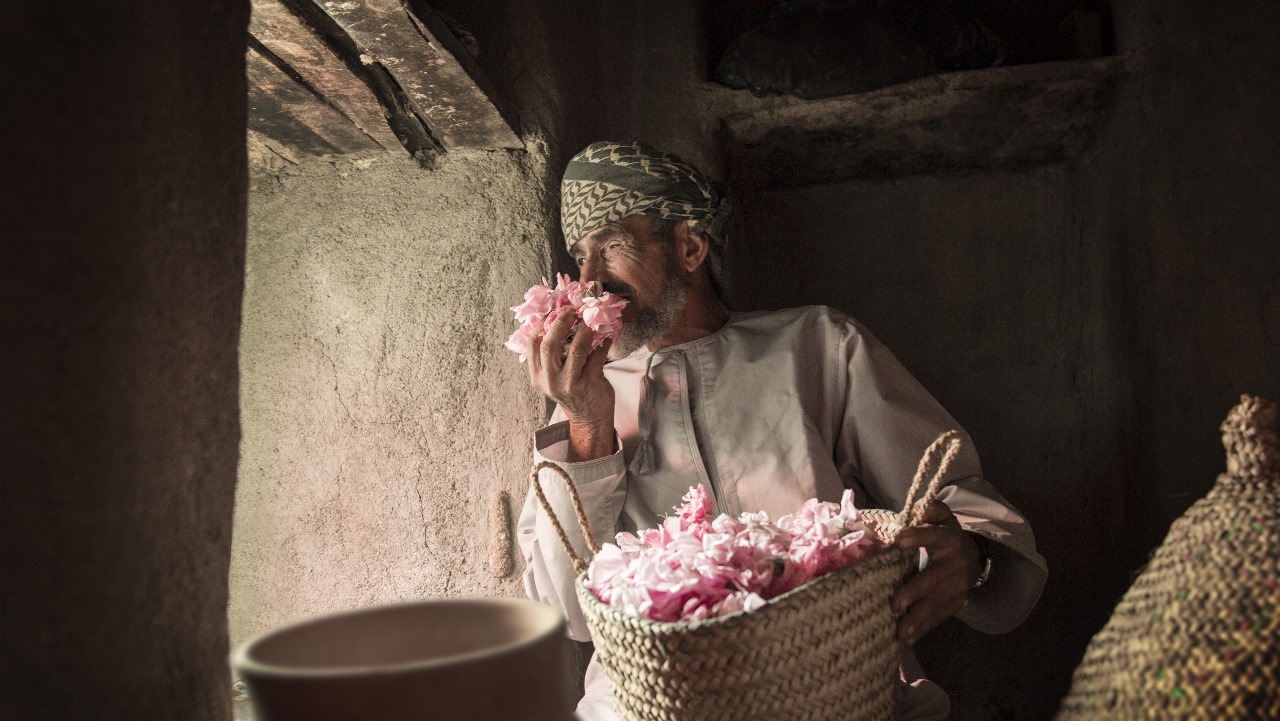
Handbook _ Ahmed Al-Zahrany
Location: Jabal Akhdar, also known as the Green Mountain, is part of the Western Hajar mountain range, rises over 2,300 meters, making it one of Oman’s most breathtaking landscapes (source: Interior Governorate Handbook). Known for its deep valleys, heritage villages, and stunning caves, the region is a haven for adventurers and explorers. It is also home to vibrant communities in villages like Siq, Al-Shurayja, Wadi Bani Habib, Al-Ain, Al-Aqr, Al-Manakher, Hail Al-Yemen, Salut, Al-Qasha, and Al-Sujra.
Weather: Jabal Akhdar has a mild summer and a strong winter, with temperatures sometimes dropping below zero, especially on rainy days. Winter visits require warm clothing and heating, while summer, starting in March, offers a pleasant climate. This marks the beginning of the famed rose-picking season, attracting tourists and adding to the region’s charm.
Importance of rose season: The rose-picking season in Jabal Akhdar is a cherished tradition that continues to captivate visitors year after year. With each season bringing the same timeless beauty, the dedication of local farmers to cultivating rose trees highlights the cultural and economic significance of this industry. Beyond its fragrant blooms, this season has become a major attraction for travelers eager to witness the art of rose water production—both in its traditional and modern forms—making it an essential experience in the heart of Oman’s mountains.
Beyond its fragrance, rose water is deeply rooted in Omani culture. It’s used in traditional remedies for migraines, culinary delights like Omani sweets, perfumes, skincare, and even as a welcoming gesture at celebrations.
The rose crop is concentrated in the villages of (Al-Aqr, Al-Ain, Al-Shariga, Saiq, Al-Qasha, Hail Al-Yemen and Hail Al-Masbet), and the number of rose trees from which different types of mountain rose water are extracted amounts to more than 5000 trees with a total area of up to 10 acres. (2023)
Time Period: The rose season of Jabal Akhdar begins in late March and lasts until the end of April, marking the first seasonal bloom of the year. The actual harvesting of roses takes place toward the end of April, after which they undergo the traditional process of distillation to produce rose water. This centuries-old craft is carried out in the homes of local families who have preserved this heritage for generations, keeping the rich legacy of Omani rose water alive.
Ways to access: Jabal Akhdar is accessible via a paved road from Vice Presidency of Banana Baraka, located 20 km east of Nizwa and 7 km west of Izki. The mountain is about 160 km from Muscat, with fully paved roads leading to it. Due to steep slopes, a four-wheel drive vehicle is required for both ascent and descent to ensure safety of the visitors.
Neighbor Villages: Location, Highlights
Wadi Bani Habib
Known for its pomegranate, walnut, and diverse trees. Features an ancient abandoned village with unique architecture. A popular year-round tourist destination.
Al Ain Village
Famous for rose water production and terraced rose plantations. A picturesque village and key tourist spot year-round.
Al-Manakher Village
Located at the Green Mountain’s forefront. Known for walnuts, pomegranates, figs, and antique houses. Offers scenic views of agricultural terraces.
Crafts & Agriculture (Al-Manakher)
Celebrated for pomegranate and rose plantations. Famous for rose water distillation, blending agriculture and craftsmanship, attracting tourists.
Wadi Tanouf & Nizwa
Features stunning views of Wadi Tanouf and the historic town of Nizwa. Provides a serene, panoramic experience in the Green Mountain region.
Al-Aqur Village
Known for its antique houses and breathtaking views of agricultural terraces.
Siq Village
Famous for pomegranate and rose plantations. Known for traditional rose water distillation.
Al-Rus Area
Offers scenic views of Wadi Tanouf in Nizwa.
Sayh Qutnah (Al-Fiyadhiyah) Area
A vital hub in the Green Mountain, home to governmental, administrative, security, commercial, and tourism offices.
Al-Sujirah Village
An ancient village over 450 years old, situated 1,900 meters above sea level. Known for its mild climate year-round and unique tourist inns.
Rose Harvest & Tourism Programs
During the rose season, visitors can explore guided agricultural tours through the scenic rose-filled villages of Al-Shurayjah, Al-Ain, Saiq, Al-Qasha, Hail Al-Yamin, and Wadi Bani Habib. Witness the delicate process of rose harvesting, experience the art of traditional rose water distillation, and savor mountain rose-infused tea.
Green Mountain Rose Festival
This annual festival celebrates the rose harvest with cultural events, workshops, and market stalls, benefiting the local community. Supported by government and private entities, it attracts tourists and promotes local businesses.
Hiking & Adventure Trails
Explore breathtaking trails, from the Al-Aqr village route to Siq or the 500-meter path to historic Al-Sujerah. Designated hiking and climbing trails cater to adventurers, while the Via Ferrata & Green Mountain Zipline offer thrilling aerial views.
Historical & Cultural Landmarks
Beit Al-Rudaydah Fortress: A historic fort with a traditional weapons exhibit and a café, set amid lush farms.
Wadi Al-Maaydin: A striking valley known for its year-round water flow and unique rock formations.
Ben Honor Museum: Opened in 2023, this heritage house in Al Aqr offers insights into Jabal Akhdar’s traditional lifestyle.
Scenic Viewpoints & Camping
Designated viewpoints along the Green Mountain road provide panoramic vistas of the surrounding villages. For nature lovers, camping spots like Tawi Sa’ada Al-Jabal Road and Khabb Hail Mahlab offer serene escapes amidst wild trees.
Dining with a View
Jabal Akhdar boasts a variety of restaurants, including the famous Nights of the Green Mountain, which offers diverse cuisines with stunning views of rose and pomegranate farms. Other dining options are available in Saih Qatana’s commercial hub and the region’s luxury hotels.

 to all..
to all.. 


